If you'd care to think about it this way, Syria is a sort of a Petri dish of
warring factions and super power influence, relatively contained within an area
about the size of North Dakota.1 Perhaps looking at these events
through a figurative microscope will help us better understand what could become a flashpoint
in heightened tensions between especially the United States and Russia.
Table of Contents
- About Syria
- Civil War
- Why is Russia Involved?
- Why is the US Involved?
- What Other States are Involved?
- Syria's Use of Chemical Weapons
- Coalition Strike, April 2018
- Protesting the Coalition Strike
- Conclusion
About Syria
Syria is bordered by Turkey to the north, Iraq to the east, Iraq and Jordan
to the south, and by Lebanon and the Mediterranean Sea to its west.
Damascus is its capital, close to its border with Lebanon.
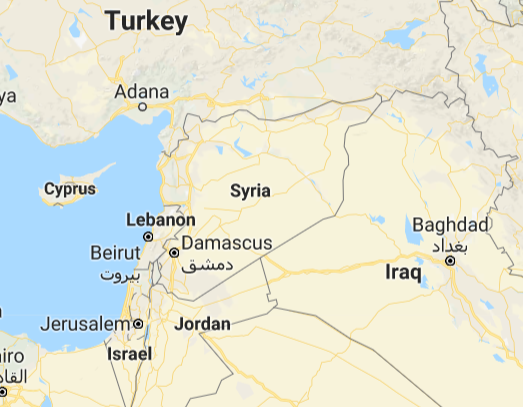
Civil War
Syria's civil war began in 2011, with the violent suppression of protests ignited
by the Arab Spring. 2. The year that followed
gave birth to several opposition groups, including the Free Syrian Army (started by
former Syrian Armed Forces officers) and the al-Nusra Front, which was later
swallowed up by ISIS.
In present day, Kurdish forces control the region of Syria north of the Euphrates
river, which is approximately one-third of the country. Other groups control smaller
regions throughout the country, as indicated on the map below, from
Al Jazeera: 3
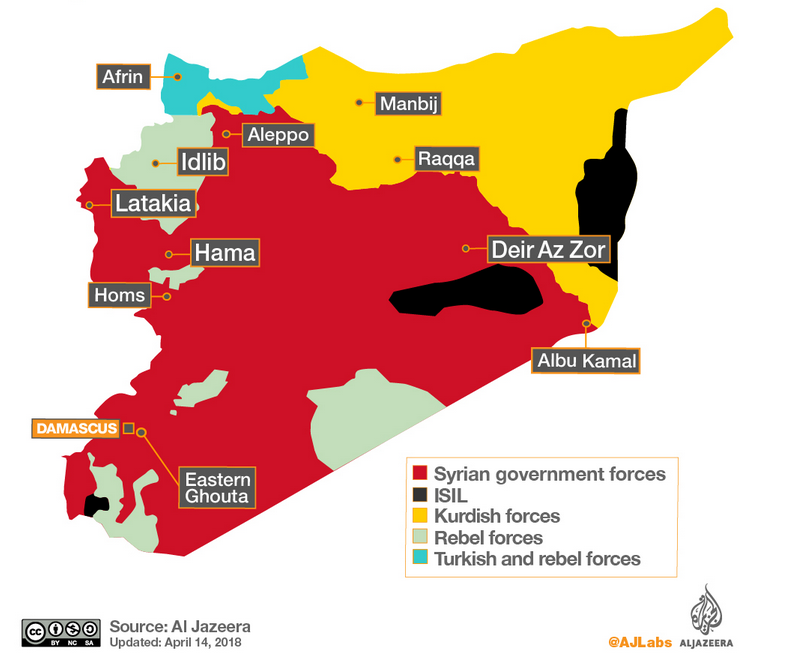
As you can see, the situation in Syria is extremely complex. The fact that super
power states have taken sides further complicates matters. The Kurds in the North
are supported by the United States, while Russia backs the government forces.
Other groups are also involved: ISIS controls some percentage of both forces'
territories, likely from Iraq. Other rebel forces have made inroads into
government-controlled lands from the northern border with Turkey, from the south
between Jordan and Iraq, and west from Jordan and Lebanon.
Why is Russia Involved?
Russia has long been an ally of Syrian President Bashar al-Assad. Syria serves as an
important access point to the Mediterranean Sea for Russian ships and a hub for Russia
in the Middle East. They have also supplied Assad with the military resources necessary
to fight back against the rebels who nearly overthrew him in 2011. 4
Russia appears to be actively involved in Syria's civil war, lending military/
paramilitary support to President Al-Assad's forces. As recently as April 12,
Russian military police and Syrian Army forces retook Eastern Ghouta, an area east
of the capital city.5
Why is the US Involved?
Reporting from The Washington Post suggests the US was originally indirectly
involved in the Syrian civil war at it's outbreak in 2011 by backing and providing
limited armament to opposition groups working to topple President Assad. By 2014, in
response to a growing ISIS threat in Iraq and in Syria, the US began conducting airstrikes
on ISIS targets, and sending in "advisers" to capture and control the ground ISIS had held.
By the time Russia started its air campaign in Syria in September 2015, the US found
itself getting caught up in disputes with other regional actors, and had "at times acted
against threats or the repeated use of chemical weapons against
civilians." 6 7
The US has since become more directly invoved in Syria, though at least in part
as a function of it's campaign against ISIS. The same reporting details incidents
involving US armed forces within Syria since at least 2016 and especially in the spring
of 2017, operating as part of a multi-national coalition against ISIS, but also training
Syrian rebel forces. The US has also led missile strikes from naval platforms
in the
Mediterranean Sea. 8
What Other States are Involved?
- Iran. The Washington Post reporting previously cited detailed a June, 2017
attack on US troops by an Iranian armed drone near a base where Syrian rebel forces
were being trained.
- France. As the former mandatory ruler of Syria 9, the French appear to have
generally taken a harder line against Syria and ISIS than even the US, and
had been calling for military intervention since 2013, admitting it had armed Syrian
rebels the following year. France significantly stepped up coordinated air strikes
against Syrian targets after the 13 November attacks in Paris. 10 11.
This doesn't necessarily mean that France is involved in Syria's civil war, but the
line between civil war actor and international coalition against ISIS seems blurred.
- Turkey. Turkey trained defectors from the Syrian Armed Forces and in 2011,
"announced the birth of the Free Syrian Army under the supervision of Turkish military
intelligence," later actively working to align itself with a post-Assad government and
providing arms and training to Syrian opposition forces. 12
- Great Britain. Reporting from Sky News in August, 2012 asserted
that the UK was providing intelligence on Syrian military movements from its bases on Cyprus
to the Turkish, who forwarded that information to the Turkish-trained Free Syrian Army.
13 14.
Syria's Use of Chemical Weapons
Over the past five years, President al-Assad used chemical weapons against people
inside of Syria. Let's first look at the 2013 attack, then the most recent attack,
and finally a quick overview of attacks that have occurred between the two.
2013 Attack
The attack happened in Ghouta, near the capital city of Damascus, in
the early hours of August 21, 2013.
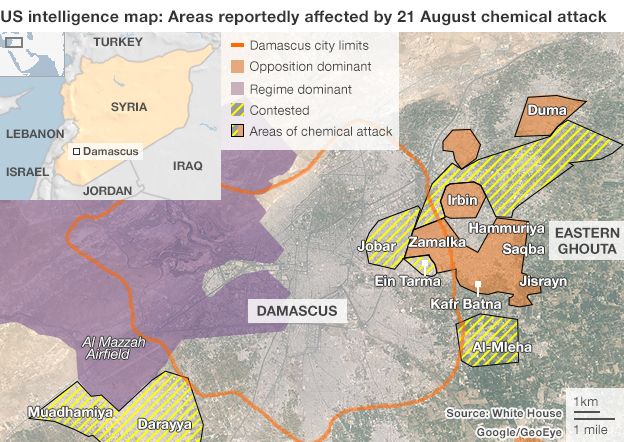
According to BBC reporting, some of the missiles used were Soviet-era M14 rockets.
15 Other rockets were
unidentified 330mm surface-to-surface missiles with a thin casing designed to peel
away at impact to expose the nerve agent sarin.
16
2018 Attack
About 42 Syrians died in the suburb of Douma, east of Damascus on April 8, 2018. 17 Reporting from The
New York Times indicated that the compound involved may have been chlorine. 18
...And all the attacks in between
The same reporting from The New York Times highlighted multiple chemical
attacks throughout the time period (read: date - chemical agent):
- April 2014 - Poison gas
- May 2015 - Chrlorine
- August 2015 - Mustard Gas
- September 2016 - Chlorine
- April 2017 - Sarin
Coalition Strike, April 2018
A coalition of US, British and French forces struck Syria's chemical weapon facilities
on Friday, April 13th. The facilities were located west of Homs near the Lebanon border,
though confidence that the destruction made a significant impact on Assad's program seems
somewhat low. 19
Each member of the coalition has shown they had greater reasons for performing the
strike than just the humanitarian mission of protecting Syrian citizens. We've established
the United States has forces inside Syria and is known to support the rebel forces, as do
the British and the French.
Protesting the Coalition Strike
Russia, Syria, and Iran immediately protested the coalition action, with Russia calling
for an emergency meeting of the UN Security Council. At that meeting, Russia was joined by
China and Bolivia in its resolution proposal. Eight countries voted against
Russia's resolution, and three abstained.
20
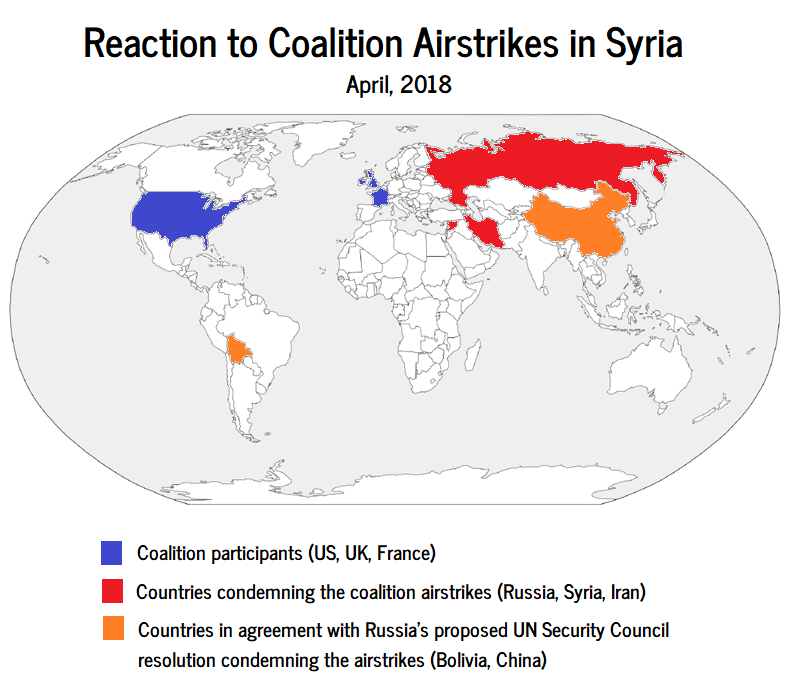
This is not the first time Russia has protested to the UN Security Council on other
countries' intrusions upon Syria's sovereignty. In early 2016, Turkey began attacking
Kurdish militia from positions inside of Turkey. Russia's attempt to have a
resolution adopted by the UN Security Council was "undermined by Western powers, including
the U.S., the UK, and France" 21 — the same countries that
participated in the most recent strikes. As the image above shows, Russia has managed
to gain at least anecdotal support from Bolivia, China, Iran, and Syria.
Conclusion
President al-Assad and his government forces have been using chemical agents over the past five
years to destroy opposition to his regime. In the seven years since the Arab Spring and
the start of Syria's civil war, the United States and key allies, in league with neighboring
Arab states, have worked to train and arm opposition forces, while Russia and its Arab state
allies have worked to support government forces.
My suspicion is that the anti-ISIS mission provides the US and its allies with sufficient
reason to operate within Syria, or at least within Iraq — meaning that as long as ISIS is
a threat in Iraq and Syria, the US has all the reason it needs to continue to work against
the Assad regime.
My primary concern has to do with the recent escalation of tensions between the Russsians
and the West and its allies. Almost every country involved in the strike, or involved in
reaction to the strike, has some "skin in the game."
"Because Reasons"
Fallout from Russia's espionage efforts related to the 2016
US presidential election continues to surface, and the murder of a former double agent in
Great Britain sparked outrage from both the British and the US, including the expulsion of
Russian diplomats from the US, and American diplomats from Russia. Though these events are
not directly related to the Syrian civil war, I can't help but wonder if events like the
coalition strikes against Syria's chemical weapons facilities are tantamount
to "poking the bear."
(I find this ironic, considering the lengths to which President Trump has gone toward
stroking the bear, against the guidance of his advisors — most recently, congratulating
President Putin on his re-election in what was widely viewed as a completely fraudulent
national election and despite direction to the contrary.) 22
Of the coalition participants, only France seems to have relatively stable relations
with Russia, having even cooperated with each other on bombing campaigns against ISIS. 23
Looking at the countries aligned with Russia in these events, China
immedately stands out because of the trade war the US seems to be starting. 24 News in recent weeks recounted new
tariffs on lists of products both American and Chinese. I don't know if it's likely that
China would continue to escalate at Russia's behest, but I think it's a result worth
considering.
The next sensible question: How are Russia's relations with China? The short answer:
apparently quite good:
[Chinese Foreign Minister and State Councilor Wang Yi], during his meeting with Russian
Foreign Minister Sergei Lavrov, declared that "China-Russia relations are in the best
period of history." He added that the two sides should seek even closer coordination in
the future, saying that "since the current international and regional situation is still
full of various uncertainties, it is necessary for China and Russia, two close strategic
partners, to strengthen communication and coordination." In talks with both Lavrov and
Russian President Vladimir Putin, Wang stressed the need for China and Russia to
coordinate on regional and global issues of interest, help safeguard each other's national
interests, and support each other in taking up larger roles on the world stage. 25
What about Iran? A Newsweek article published at the start of 2018 may offer
some insight:
Iran's leadership has blamed foreign powers, especially the U.S., for having a hand in recent,
deadly protests that have swept the country, pointing to President Donald Trump's immediate
support for demonstrators on social media and the U.S.'s long history of invasions and
interventions that includes an early interference into Iranian politics that shaped the
modern relationship between the two nations.
As Iranian Foreign Ministry spokesperson Bahram Qasemi blasted Trump's eager backing of
Iranians taking to the street to protest economic conditions and strict religious rule,
Iran's supreme leader and top authority, Shiite Muslim cleric Ayatollah Ali Khamenei,
commented on the situation for the first time Tuesday. Khamenei warned of foreign meddling
behind the country's civil unrest, but maintained that "what prevents the enemies and their
hostile actions is the spirit of courage, self-sacrifice and faith among the people." 26
Does it seem Iran has a grievance against the United States? Well, how warm are relations
between Russia and Iran?
Since President Trump took office, in 2017, Moscow and Tehran have shared increasingly
common bonds: growing tensions with Washington and a quest to expand spheres of influence
in the Middle East.27
Does it make sense that Russia will find other nation states with an axe to grind against
the United States and pull them into Russia's orbit?
In a radio speech during WWII, Winston Churchill famously said, "The enemy of my enemy
is my friend." Russia's warming relations with at least China and Iran could eventually
spell trouble for the US and its allies should tensions increase beyond diplomatic capability.
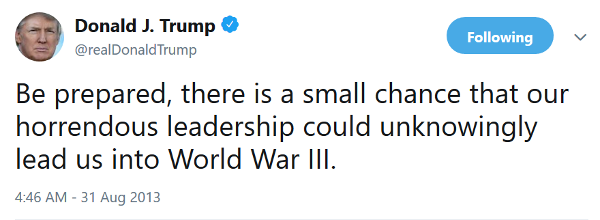 28
28